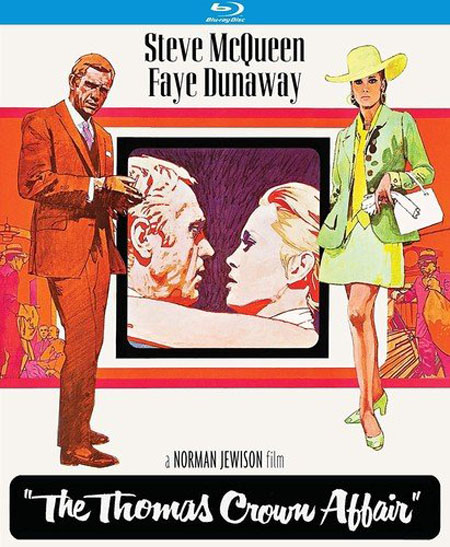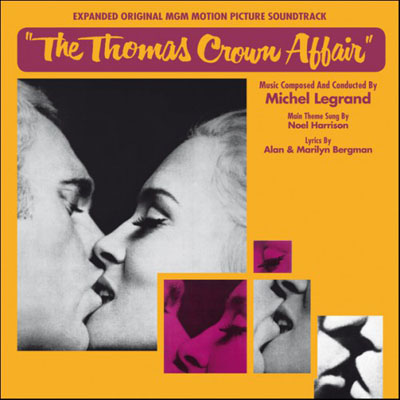
By Raymond Benson
(A
previous 50th Anniversary edition of this film was released in 2018
by Kino Lorber and was reviewed on Cinema Retro in 2020. The film has
been re-issued on Blu-ray as a “Special Edition” in 2024. Much of the following
review is repeated, but updated, from the earlier piece.)
The
late director Norman Jewison, who passed away on January 20, 2024, was on a
roll in the late 1960s. After a handful of well-received small romantic
comedies, he directed The Cincinnati Kid (1965) featuring Steve McQueen as
a Depression-era poker player, followed by the Oscar Best Picture-nominated The
Russians are Coming, the Russians are Coming (1966), and then the brilliant
In the Heat of the Night (1967), which did win the Best Picture
Oscar and landed Jewison a Director nomination.
His
next project became a heist picture/romance, the story of which was pitched to
him by Alan R. Trustman, a lawyer with no screenwriting experience. Jewison was
intrigued, so, according to the excellent interview with the director that
appears as a supplement on Kino Lorber’s new Blu-ray edition of The Thomas
Crown Affair, he gave Trustman a crash course in how to write a movie
script. When it was completed, Jewison got the film green-lit.
When
Jewison’s agent—who also represented Steve McQueen—read the screenplay, he
suggested McQueen for the part. Even though the actor and director had gotten
along on Cincinnati Kid, Jewison admits that he didn’t think McQueen was
right for the role because the actor never wore suits. McQueen then met with
the director—wearing a suit—and convinced him that he could be Thomas Crown.
The
Thomas Crown Affair is
a stylish, twisty-turny, clever piece of 1968 pizazz. It emphasizes the
ultra-cool cosmopolitan and fancy lifestyle of the rich during the Mad Men era
when it was actually happening. The flashy camerawork and then-innovative
split-screen/multi-screen display of simultaneous action scenes was snappy and
unique. The brilliant main title designer, the late Pablo Ferro, is credited
for much of this work, and it is this visual technique that gives the movie its
pulse.
Crown
is a former banker in Boston, a happily wealthy playboy-sportsman who decides
to pull off a complicated bank heist simply because he can. He puts together a
team of individuals (including getaway driver Jack Weston) who don’t know each
other or him, and the gang meets only at the time of the robbery inside the
bank. Crown himself isn’t there. The heist is successful, and the mastermind
gets away with $2.6 million. Detective Malone (Paul Burke) is determined to
catch whoever was responsible, but the crime was too well thought out. No evidence
or clues were left behind. An insurance investigator, Vicki Anderson (Faye
Dunaway, in her first role post-Bonnie and Clyde), is brought in and she
immediately takes control of the operation, much to Malone’s chagrin. It
doesn’t take long for Crown to come under Vicki’s suspicions—so she sets out to
entrap him by, well, having an affair with him.
That’s
the plot in a nutshell. While much of it is seemingly improbable, the story is
told with conviction and such technical prowess that it’s hard not to go along
for the ride. Jewison’s handling of the heist itself and the romantic sequences
between the dual eye candy, McQueen and Dunaway, is masterful. Both actors are
fine in their roles; McQueen especially continues to exude the 60s cool that
was his trademark.

Kino
Lorber’s brand new 4K restoration looks quite good, and it comes with two audio
commentaries—one by Jewison himself, and the other by film historians Lem Dobbs
and the late Nick Redman. Supplements
include the previously mentioned interview with an aging Jewison, who was still
sharp and talkative, an interview with title designer and split-screen maestro
Ferro, and a vintage on-the-set featurette from 1967 with the cast and crew.
The original theatrical trailer, along with other Kino Lorber releases,
complete the disk.
The
Thomas Crown Affair was
remade by John McTiernan in 1999 with Pierce Brosnan and Rene Russo. Was it
better than the original? Maybe yes, maybe no. Only you can decide; but
consider this—the 1968 version has Steve McQueen, a young Faye Dunaway, a
variety of really hot and nifty sports cars, and an Oscar-winning title song,
“The Windmills of Your Mind” (remember that?)! Recommended.